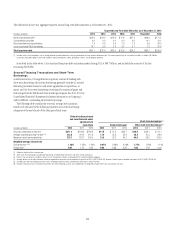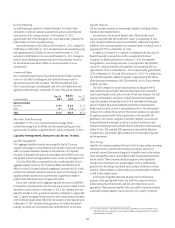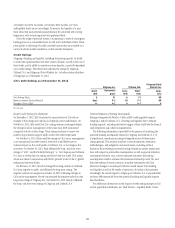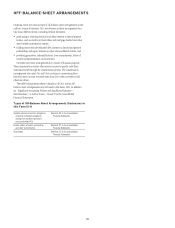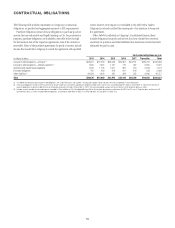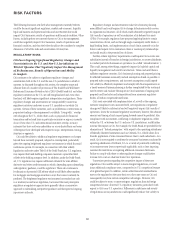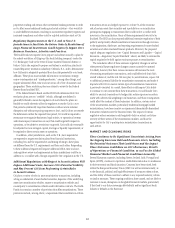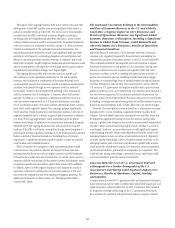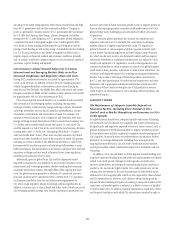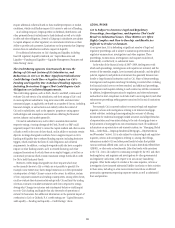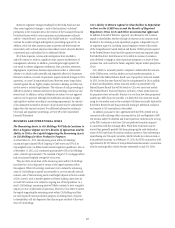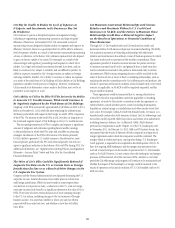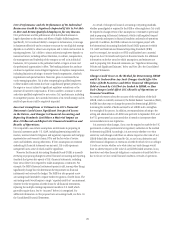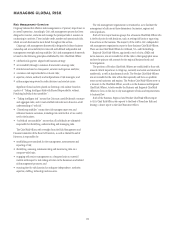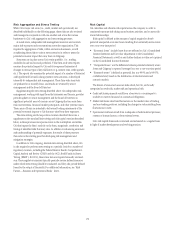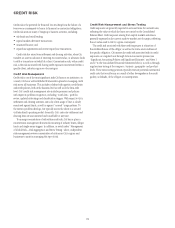Citibank 2012 Annual Report Download - page 86
Download and view the complete annual report
Please find page 86 of the 2012 Citibank annual report below. You can navigate through the pages in the report by either clicking on the pages listed below, or by using the keyword search tool below to find specific information within the annual report.64
The impact of the ongoing Eurozone debt and economic crisis and other
developments in the EMU could be even more significant if they lead to a
partial or complete break-up of the EMU. The exit of one or more member
countries from the EMU could result in certain obligations relating to
the exiting country being redenominated from the Euro to a new country
currency. Redenomination could be accompanied by immediate revaluation
of the new currency as compared to the Euro and the U.S. dollar, the extent
of which would depend on the particular facts and circumstances. Any
such redenomination/revaluation would cause significant legal and other
uncertainty with respect to outstanding obligations of counterparties and
debtors in any exiting country, whether sovereign or otherwise, and would
likely lead to complex, lengthy litigation. Redenomination/revaluation could
also be accompanied by the imposition of exchange and/or capital controls,
required functional currency changes and “deposit flight.”
The ongoing Eurozone debt and economic crisis has created, and
will continue to create, significant uncertainty for Citi and the global
economy. Any occurrence or combination of the events described above
could negatively impact Citi’s businesses, results of operations and financial
condition, both directly through its own exposures as well as indirectly.
For example, at times, Citi has experienced widening of its credit spreads
and thus increased costs of funding due to concerns about its Eurozone
exposure. In addition, U.S. regulators could impose mandatory loan loss
and other reserve requirements on U.S. financial institutions, including
Citi, if a particular country’s economic situation deteriorates below a certain
level, which could negatively impact Citi’s earnings, perhaps significantly.
Citi’s businesses, results of operations and financial condition could also be
negatively impacted due to a decline in general global economic conditions
as a result of the ongoing Eurozone crises, particularly given its global
footprint and strategy. In addition to the uncertainties and potential impacts
described above, the ongoing Eurozone crisis and/or partial or complete
break-up of the EMU could cause, among other things, severe disruption to
global equity markets, significant increases in bond yields generally, potential
failure or default of financial institutions (including those of systemic
importance), a significant decrease in global liquidity, a freeze-up of global
credit markets and worldwide recession.
While Citi endeavors to mitigate its credit and other exposures related
to the Eurozone, the potential outcomes and impact of those outcomes
resulting from the Eurozone crisis are highly uncertain and will ultimately
be based on the specific facts and circumstances. As a result, there can be no
assurance that the various steps Citi has taken to protect its businesses, results
of operations and financial condition against these events will be sufficient.
In addition, there could be negative impacts to Citi’s businesses, results of
operations or financial condition that are currently unknown to Citi and
thus cannot be mitigated as part of its ongoing contingency planning. For
additional information on these matters, see “Managing Global Risk—
Country Risk” below.
The Continued Uncertainty Relating to the Sustainability
and Pace of Economic Recovery in the U.S. and Globally
Could Have a Negative Impact on Citi’s Businesses and
Results of Operations. Moreover, Any Significant Global
Economic Downturn or Disruption, Including a Significant
Decline in Global Trade Volumes, Could Materially and
Adversely Impact Citi’s Businesses, Results of Operations
and Financial Condition.
Like other financial institutions, Citi’s businesses have been, and could
continue to be, negatively impacted by the uncertainty surrounding the
sustainability and pace of economic recovery in the U.S. as well as globally.
This continued uncertainty has impacted, and could continue to impact,
the results of operations in, and growth of, Citi’s businesses. Among other
impacts, continued economic concerns can negatively affect Citi’s ICG
businesses, as clients cut back on trading and other business activities, as
well as its Consumer businesses, including its credit card and mortgage
businesses, as continued high levels of unemployment can impact payment
and thus delinquency and loss rates. Fiscal and monetary actions taken by
U.S. and non-U.S. government and regulatory authorities to spur economic
growth or otherwise, such as by maintaining a low interest rate environment,
can also have an impact on Citi’s businesses and results of operations. For
example, actions by the Federal Reserve Board can impact Citi’s cost of funds
for lending, investing and capital raising activities and the returns it earns on
those loans and investments, both of which affect Citi’s net interest margin.
Moreover, if a severe global economic downturn or other major economic
disruption were to occur, including a significant decline in global trade
volumes, Citi would likely experience substantial loan and other losses and
be required to significantly increase its loan loss reserves, among other
impacts. A global trade disruption that results in a permanently reduced level
of trade volumes and increased costs of global trade, whether as a result of
a prolonged “trade war” or some other reason, could significantly impact
trade financing activities, certain trade dependent economies (such as the
emerging markets in Asia) as well as certain industries heavily dependent
on trade, among other things. Given Citi’s global strategy and focus on the
emerging markets, such a downturn and decrease in global trade volumes
could materially and adversely impact Citi’s businesses, results of operation
and financial condition, particularly as compared to its competitors. This
could include, among other things, a potential that any such losses would
not be tax benefitted, given the current environment.
Concerns About the Level of U.S. Government Debt and
a Downgrade (or a Further Downgrade) of the U.S.
Government Credit Rating Could Negatively Impact Citi’s
Businesses, Results of Operations, Capital, Funding
and Liquidity.
Concerns about the level of U.S. government debt and uncertainty relating to
fiscal actions that may be taken to address these and related issues have, and
could continue to, adversely affect Citi. In 2011, Standard & Poor’s lowered
its long-term sovereign credit rating on the U.S. government from AAA to
AA+, and Moody’s and Fitch both placed such rating on negative outlook.


